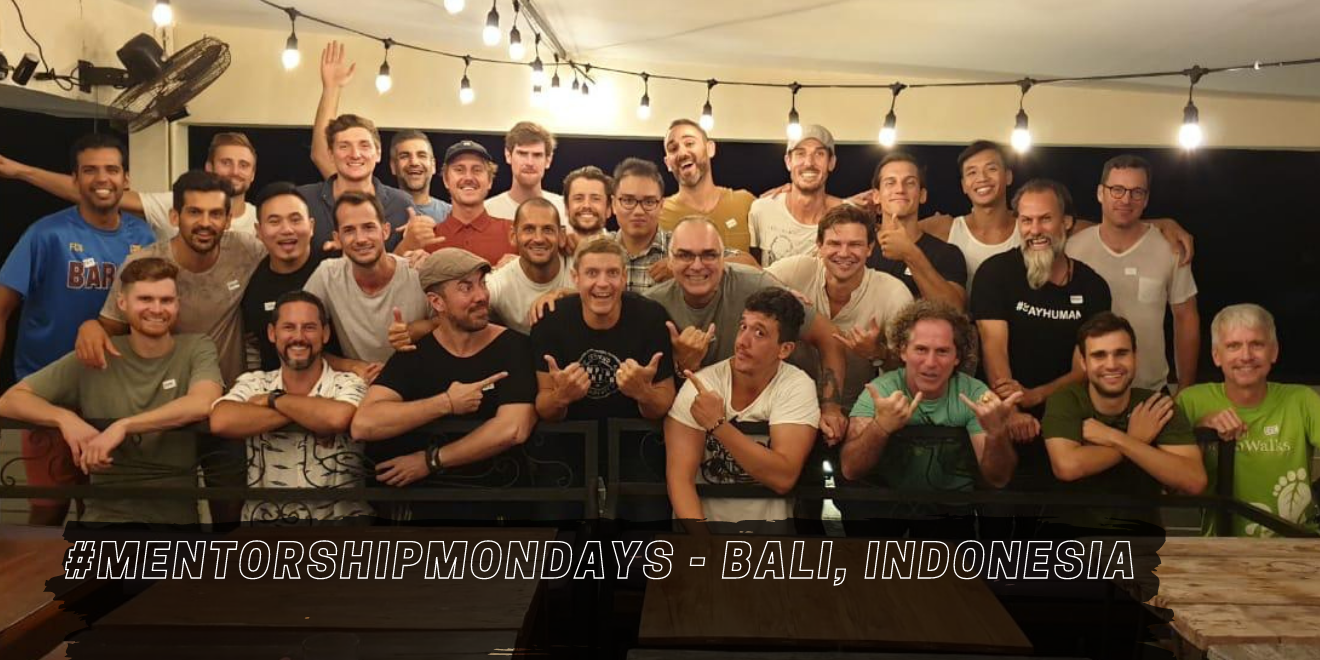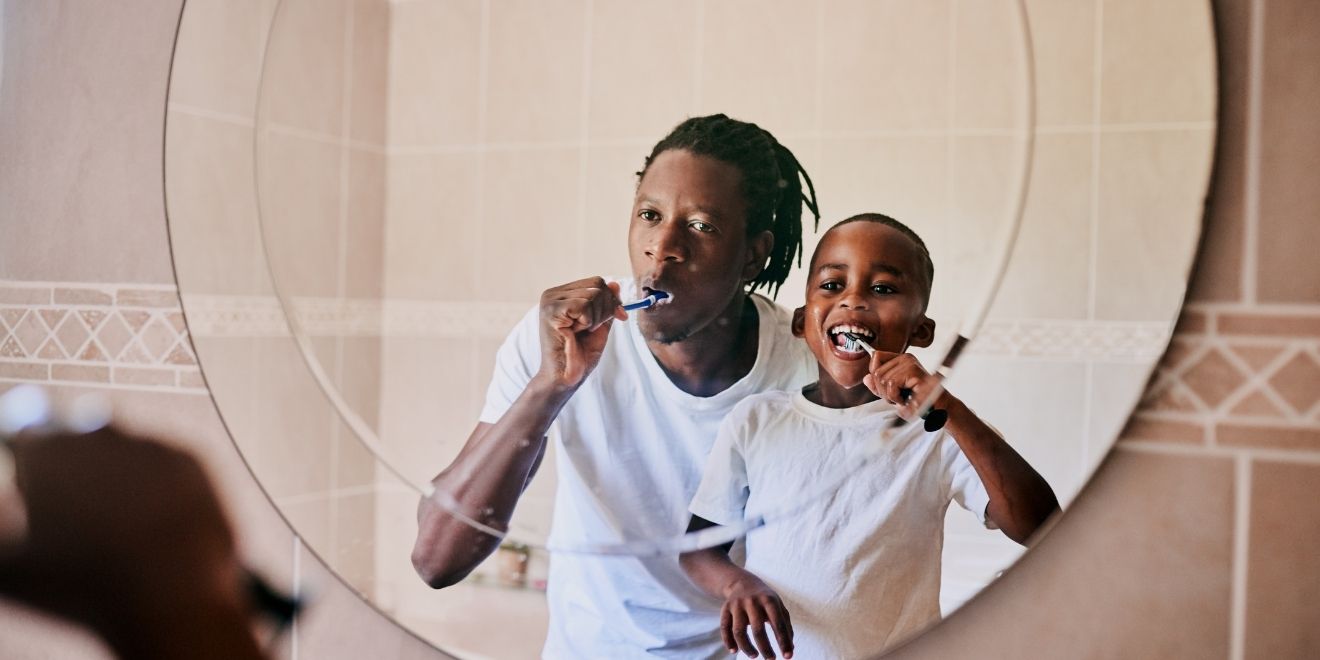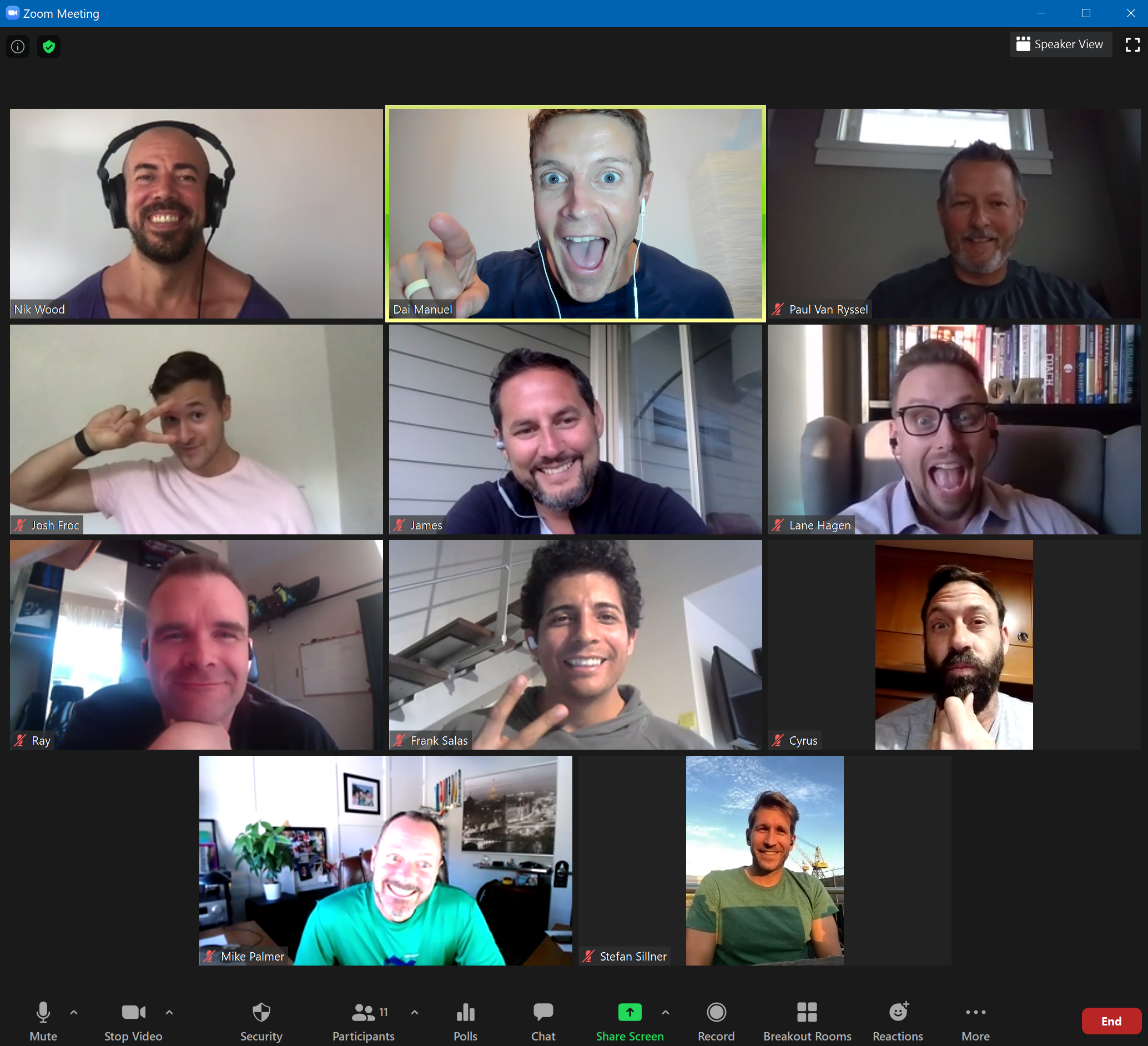Mental Health Tips for Super Dads

In today's article, I'm going to examine the best mental health tips for super dads. Whether you’re a new father looking after your first child or you’re a little more experienced with a few already running around, it’s always important for dads to address their mental health.

Maintaining good practices and a healthy routine is the first step in developing good mental well-being practices and can help you be a more productive and empathetic father and partner.
Maintaining a regular exercise routine and healthy eating habits are some of the most common suggestions mental health professionals have for fathers that are stressed and overwhelmed in their daily lives. These habits improve your sleep, manage stress levels, and give you an outlet for any pent-up frustration and emotion.

At first, it may not seem like an activity that's going to bring you joy.
However, many parents find that the time outside of the house actually gives them a little more breathing room which they grow to anticipate during the day.
Adjusting your snacking habits and meals to revolve around healthy eating will also increase your stamina and reduce health risks. Sometimes it's easy to reach for the quick, frozen dinner or chip bag.
However, having a family meal and switching up your grocery list for quality snacks will reduce your chances of eating out of boredom, skipping meals, and missing out on time together as a family. Helping your partner plan out weekly meals and helping them shop for ingredients also builds communication and teamwork that's essential in maintaining a positive relationship in the first years of your child’s life.
Maintaining connections with others is crucial during this time, whether you’re a new dad or not. You and your partner will need all of the help you can get, and this includes having an outlet to freely express yourself.
[caption id="attachment_37428" align="aligncenter" width="1320"] #MENtorship Mondays
weekly online and offline gatherings are perfect for men looking to connect with other woke men[/caption]
#MENtorship Mondays
weekly online and offline gatherings are perfect for men looking to connect with other woke men[/caption]
Whether it’s a group chat with friends, regular visits to your family members, or scheduling an appointment with a mental health professional, having those interactions with people gives you a chance to let out stress and frustrations.
Mental health conditions like depression and anxiety can manifest if symptoms aren’t addressed early enough. Putting aside time to reach out for professional help will reduce your risk of developing stress-related illnesses as well.
Online therapy from providers like MyTherapist is more widely available, making a visit easier when you and your partner are taking care of a newborn.
While you and your partner both need space and support groups that you can go to individually, regular communication between the two of you is just as important.

You’re both working to build a good family dynamic and it should be a team effort. That means sharing both the good and the bad news, working through any bumps or frustrations, and trading off duties every now and then.
Whether you’re living together or working through co-parenting, your child’s wellbeing is the number one priority. A healthy relationship between you and your partner is going to develop the foundation of their life.
It’s up to you both to create a safe environment for them to feel loved, where they’ll pick up on your cues and emotional signals. Communication with your partner reduces friction, misunderstandings, and stress.
It's not selfish to have time set aside for yourself.
In fact, it's healthy for you to fill that time with an active hobby that taps into your personality. A hobby builds motivation, boosts your energy, and is a stress-relieving time for you to unwind.
Pick up something that you can easily focus on, shifting into auto-pilot mode. These kinds of activities can even help regulate your heart rate and breathing, decreasing anxiety, and stress.

Whether it’s virtual classes, carpentry, or even spending time on a crossword puzzle, it should be relaxing and something you walk away from feeling refreshed.
Activities like intense video games and frustrating projects that can’t be interrupted aren’t necessarily the best choice. These can end up adding stress and irritation; if you’re consulting a mental health care professional, you can ask for some pastime suggestions that can put you in a better mood.
Together, you and your therapist can dig into your personality traits and look for a hobby that you’ll enjoy.
With a child, routines are regularly derailed. If left entirely undone, this can lead to stress, lack of focus, and possibly missed meals and sleep. Keeping a general guideline of tasks to accomplish throughout the day is the first step when you’re a new dad.
As your child grows older and you’re able to establish a more solid schedule, those tasks need to still stay relevant.

Your primary tasks should generally include certain things like regular meals, exercise, hobbies, quality time with your partner and your child, and room for self-check-in.
Parents need to remember to take regular breaks for themselves in order to reduce stress and the risk of becoming overwhelmed.
Consulting other dads gives you an opportunity to expand your knowledge as a father and a partner.
Connection with others is already a core boost to your mental health and finding similar individuals provides a connection that other people may not be able to give.
[caption id="attachment_37432" align="aligncenter" width="2068"] Join an online men's group like #MENtorshipMondays
[/caption]
Join an online men's group like #MENtorshipMondays
[/caption]
It’s common for dads to feel socially isolated, with one study citing about 20% of new fathers saying they lost friends after having a kid. The same study found that without those close friends, the first year of fatherhood was harder for individuals.
Whether you find a support group on Facebook or talk to a few random dads at the park, it’s important to reach out for that connection.
https://www.youtube.com/watch?v=nUZc_fNNCV0
New friends can be awkward at first, but there are others in similar situations that are just as unsure about meeting new people. Your conversations don’t even have to revolve around kids: finding other fathers that are looking for something new to talk about or hobbies to chat over is also fairly common.
Developing a bond early on with your child is not only beneficial for their development, but for your mental health. Letting your kid take the lead on activities you do together builds that bond of trust and excitement, letting them have control of the situation.

Regularly scheduled solo time can be for half an hour after dinner, together when you wake them up, or even for a play date on weekends. That time becomes something they look forward to and they associate that happy feeling with you being there.
Letting your child lead the activity makes them more likely to develop a sense of responsibility and structure. It gives them the chance to understand how rules work when they have the opportunity to create them – watching you following their rules makes them more likely to understand the dynamic.
While this all sounds like a great benefit for your child, it also takes off some stress for you. You’re able to spend some time with your kid, which is a positive pastime for many parents, and the more they learn through these sessions, the less time you’re spending attempting to explain it another way.
Being a dad is both a blessing and a challenge that can take many different routes. In order to capitalize on the time you have with your child, it’s important to keep yourself healthy both physically and mentally.

Consulting a therapist, developing a flexible routine, and remaining open and honest about your emotions will reduce your stress and risk of health conditions. As you’re developing a relationship with your child, having that structure will benefit their learning process and your ability to teach.

Maintaining good practices and a healthy routine is the first step in developing good mental well-being practices and can help you be a more productive and empathetic father and partner.
Exercise & Healthy Eating
Maintaining a regular exercise routine and healthy eating habits are some of the most common suggestions mental health professionals have for fathers that are stressed and overwhelmed in their daily lives. These habits improve your sleep, manage stress levels, and give you an outlet for any pent-up frustration and emotion.

At first, it may not seem like an activity that's going to bring you joy.
However, many parents find that the time outside of the house actually gives them a little more breathing room which they grow to anticipate during the day.
Adjusting your snacking habits and meals to revolve around healthy eating will also increase your stamina and reduce health risks. Sometimes it's easy to reach for the quick, frozen dinner or chip bag.
However, having a family meal and switching up your grocery list for quality snacks will reduce your chances of eating out of boredom, skipping meals, and missing out on time together as a family. Helping your partner plan out weekly meals and helping them shop for ingredients also builds communication and teamwork that's essential in maintaining a positive relationship in the first years of your child’s life.
Keeping a Strong Support Group
Maintaining connections with others is crucial during this time, whether you’re a new dad or not. You and your partner will need all of the help you can get, and this includes having an outlet to freely express yourself.
[caption id="attachment_37428" align="aligncenter" width="1320"]
 #MENtorship Mondays
weekly online and offline gatherings are perfect for men looking to connect with other woke men[/caption]
#MENtorship Mondays
weekly online and offline gatherings are perfect for men looking to connect with other woke men[/caption]Whether it’s a group chat with friends, regular visits to your family members, or scheduling an appointment with a mental health professional, having those interactions with people gives you a chance to let out stress and frustrations.
Mental health conditions like depression and anxiety can manifest if symptoms aren’t addressed early enough. Putting aside time to reach out for professional help will reduce your risk of developing stress-related illnesses as well.
Online therapy from providers like MyTherapist is more widely available, making a visit easier when you and your partner are taking care of a newborn.
Maintaining Partner Communication
While you and your partner both need space and support groups that you can go to individually, regular communication between the two of you is just as important.

You’re both working to build a good family dynamic and it should be a team effort. That means sharing both the good and the bad news, working through any bumps or frustrations, and trading off duties every now and then.
Whether you’re living together or working through co-parenting, your child’s wellbeing is the number one priority. A healthy relationship between you and your partner is going to develop the foundation of their life.
It’s up to you both to create a safe environment for them to feel loved, where they’ll pick up on your cues and emotional signals. Communication with your partner reduces friction, misunderstandings, and stress.
Finding an Active Hobby
It's not selfish to have time set aside for yourself.
In fact, it's healthy for you to fill that time with an active hobby that taps into your personality. A hobby builds motivation, boosts your energy, and is a stress-relieving time for you to unwind.
Pick up something that you can easily focus on, shifting into auto-pilot mode. These kinds of activities can even help regulate your heart rate and breathing, decreasing anxiety, and stress.

Whether it’s virtual classes, carpentry, or even spending time on a crossword puzzle, it should be relaxing and something you walk away from feeling refreshed.
Activities like intense video games and frustrating projects that can’t be interrupted aren’t necessarily the best choice. These can end up adding stress and irritation; if you’re consulting a mental health care professional, you can ask for some pastime suggestions that can put you in a better mood.
Together, you and your therapist can dig into your personality traits and look for a hobby that you’ll enjoy.
Keeping a Routine
With a child, routines are regularly derailed. If left entirely undone, this can lead to stress, lack of focus, and possibly missed meals and sleep. Keeping a general guideline of tasks to accomplish throughout the day is the first step when you’re a new dad.
As your child grows older and you’re able to establish a more solid schedule, those tasks need to still stay relevant.

Your primary tasks should generally include certain things like regular meals, exercise, hobbies, quality time with your partner and your child, and room for self-check-in.
Parents need to remember to take regular breaks for themselves in order to reduce stress and the risk of becoming overwhelmed.
Talking to Other Dads
Consulting other dads gives you an opportunity to expand your knowledge as a father and a partner.
Connection with others is already a core boost to your mental health and finding similar individuals provides a connection that other people may not be able to give.
[caption id="attachment_37432" align="aligncenter" width="2068"]
 Join an online men's group like #MENtorshipMondays
[/caption]
Join an online men's group like #MENtorshipMondays
[/caption]It’s common for dads to feel socially isolated, with one study citing about 20% of new fathers saying they lost friends after having a kid. The same study found that without those close friends, the first year of fatherhood was harder for individuals.
Whether you find a support group on Facebook or talk to a few random dads at the park, it’s important to reach out for that connection.
https://www.youtube.com/watch?v=nUZc_fNNCV0
New friends can be awkward at first, but there are others in similar situations that are just as unsure about meeting new people. Your conversations don’t even have to revolve around kids: finding other fathers that are looking for something new to talk about or hobbies to chat over is also fairly common.
Having Solo Time with Your Child
Developing a bond early on with your child is not only beneficial for their development, but for your mental health. Letting your kid take the lead on activities you do together builds that bond of trust and excitement, letting them have control of the situation.

Regularly scheduled solo time can be for half an hour after dinner, together when you wake them up, or even for a play date on weekends. That time becomes something they look forward to and they associate that happy feeling with you being there.
Letting your child lead the activity makes them more likely to develop a sense of responsibility and structure. It gives them the chance to understand how rules work when they have the opportunity to create them – watching you following their rules makes them more likely to understand the dynamic.
While this all sounds like a great benefit for your child, it also takes off some stress for you. You’re able to spend some time with your kid, which is a positive pastime for many parents, and the more they learn through these sessions, the less time you’re spending attempting to explain it another way.
Setting the Pace
Being a dad is both a blessing and a challenge that can take many different routes. In order to capitalize on the time you have with your child, it’s important to keep yourself healthy both physically and mentally.

Consulting a therapist, developing a flexible routine, and remaining open and honest about your emotions will reduce your stress and risk of health conditions. As you’re developing a relationship with your child, having that structure will benefit their learning process and your ability to teach.




































































































